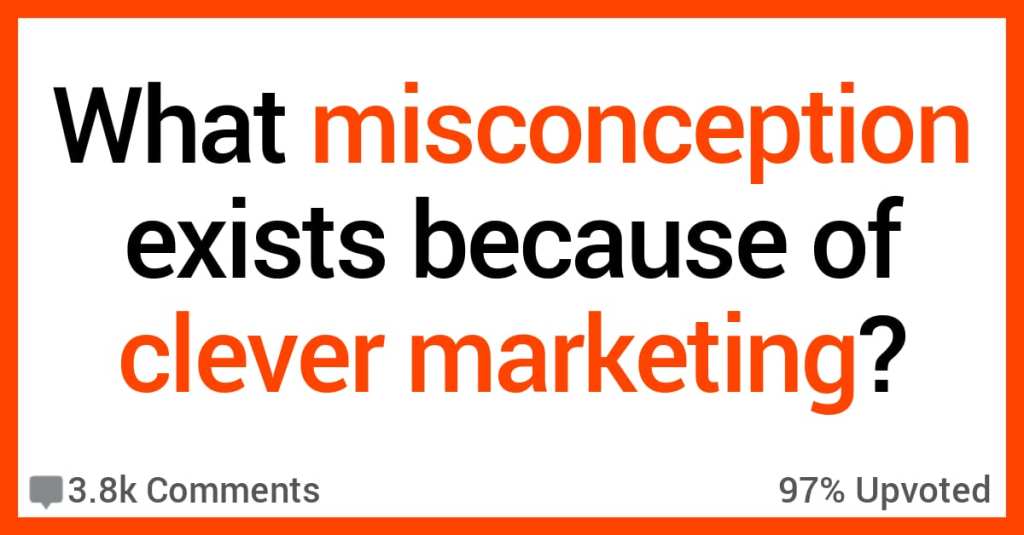Even when you don’t necessarily realize it, marketing is having an effect on you.
It’s literally EVERYWHERE you look. Your phone, billboards when you’re driving, TV, everywhere.
And it influences us in some pretty interesting ways…
What misconceptions do we have because of clever marketing?
Here’s what people had to say on AskReddit.
1. Can be dangerous.
“That things with “zero sugar” can still have 0.2 grams of sugar per unit.
Which is why Tic Tacs claim to be zero sugar but can still be dangerous for a diabetic person.”
2. Not natural.
“Most fruits and vegetables aren’t natural.
Their naturally occurring ancestors are nothing like you’d imagine.”
3. Time to double up.
“”Plop plop, fizz fizz. Oh what a relief it is”.
Alka Seltzer marketing.
You only need one tablet to work. But they realized this and started selling it as the fact that you needed two.”
4. Low fat.
“Low fat is good for you.
Well not just clever marketing, also lots of lobbying from the sugar industry
Found this out from a guy I used to work with – he was trying to lose weight and said he had to avoid “low-fat” and “fat free” products.
When I asked why he said he was diabetic and they add more sugar to compensate for the taste since theres less/no fat.
After that I really started paying more attention to nutrition facts on the label instead of just the catchy labelling on the front.”
5. Hello, fellow cool kids!
“That teenagers are cool.
Teen culture is 95% manufactured by suits trying to make a buck.”
6. Funny.
“In Japan, everyone who bothers to celebrate Christmas (which is not a holiday traditionally celebrated in Japan) eats fried chicken (whose supply is dominated by KFC) during the Christmas holiday period because KFC’s advertising campaign made it appear as if that’s what you’re supposed to do for Christmas.
Since Christmas was a relatively new holiday to Japan, and they didn’t have a point of reference for Christmas traditions, KFC’s marketing essentially created a uniquely Japanese Christmas tradition that is very lucrative for KFC.”
7. Don’t need it.
“That you need to detox and “cleanse” your body with pills and raw juices and whatnot.
You have a liver and a pair of kidneys that detoxes your body 24/7 for free.
Save your money.”
8. I did not know that!
“That Napoleon was short.
He was of normal height for the time but because of British propaganda he is remembered as being a shorty.”
9. Not unhealthy.
“White potatoes are somehow unhealthy even though they are a very nutritious starchy root VEGETABLE.
Just because when you smother oil and ranch on it it becomes unhealthy does not mean potatoes themselves are unhealthy.”
10. Hmmm…
“That you don’t respect / think your girlfriend is worth it if you don’t shell out thousands of dollars on a ring.
There are literally millions of people out there who believe this garbage.
There are also literally women out there who will get extremely angry/offended or leave their partner if their diamond ring is “fake”.
What the f**k?”
11. Organic food.
“Organic food is better for the environment.
The main issue is that organic food is less intensive, therefore requires more land per calorie of food.
This leads to greater habitat loss, deforestation, and less carbon capture.
There are environmental positives too, but the balance between pros and cons is hard to estimate.”
12. Nice and smooth.
“That women need to shave their legs.
Shaving for the longest time was scene as a masculine thing but became marketed towards women as a way to access more people and more money.
I think Gillette started this.”
13. Religious frenzy.
“”Black cats are bad luck.”
Buncha scared religious people decide that witches keep black cats.
Then years of villains having black cats in radio/tv/movies/etc, and even today, its hard for the adorable mini panthers to find homes.”
14. Not so fast…
“Oil change every 3000 miles.
Back in the 1960’s -80’s, cars would burn oil, so getting your oil changed every 3000 miles was the rule of thumb.
Since the 90’s, car engines stopped burning oil, and the interval between changes is anywhere between 7000-10000 miles(depending on synthetic or not).
But oil change shops still advertise 3000 mile oil change intervals.”
What do you think about this?
Share your thoughts with us in the comments.
We’d love to hear from you!






